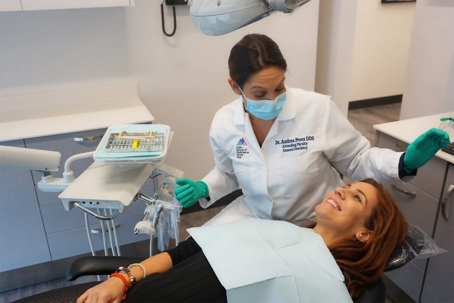Why You Need to Worry About Oral Cancer & What You Can Do to Prevent It
We all like to believe that taking regular visits to the dentist equates to good oral health. However, statistics show only 15%-25% of those who regularly visit their dentist receive an oral cancer screening. Oral cancer can seriously affect your health and should not be ignored. In its earliest stages, oral cancer is virtually undetectable with the naked eye. Most cases of oral cancer are identified late because of a lack of public awareness. Every day, 132 people are diagnosed with oral cancer in the United States and one person dies from oral cancer every hour!
Regular screenings and early diagnosis can make a world of difference in beating oral cancer and preventing it from developing. Screenings are performed visually or with the use of a screening tool like Identafi. However, this service often includes an extra fee. ProHEALTH Dental provides screenings free of charge, as we believe that the more you know, the better you can protect your health. Our philosophy focuses on all the oral needs of a patient as well as their overall health and well-being.
When found early, oral cancer has an 80-90% survival rate. Here are some important steps you can take to practice prevention:
- Request an oral cancer screening at every dental checkup.
- Talk to your dentist if you experience any of the following symptoms – persistent mouth sores or pain, numbness, white or red patches on your gums, tongue, or tonsils, difficulty chewing or swallowing, weight loss, or persistent bad breath.
- Perform monthly self-screenings, paying attention to the floor of the mouth and sides of the tongue. Ask your dentist if any of these symptoms continue for more than two weeks: white, red spots or sores on your tongue or mouth, swelling in your throat, neck, or mouth.
- If something is suspicious, get it biopsied—this is the only way to diagnose oral cancer.
Most cases of oral cancer are diagnosed in people over 40 but more instances are being seen in young people. You are at particularly high risk if any of the following apply to you:
- You regularly smoke cigarettes, chew tobacco, and/or drink alcohol heavily.
- A small number of oral cavity cancers occur from HPV. Statistics show that up to 80% of Americans will have HPV infections in their lifetime.
- You are a man – men are twice as likely as women to develop oral cancer.
- You are over the age of 50.
- You work outdoors – lip cancer is more common in people with extensive, regular exposure to sunlight.
- Bi-annual visits to the dentist and routine oral cancer screenings are critical to maintaining your well-being, regardless of your age, gender, and/or overall health.

